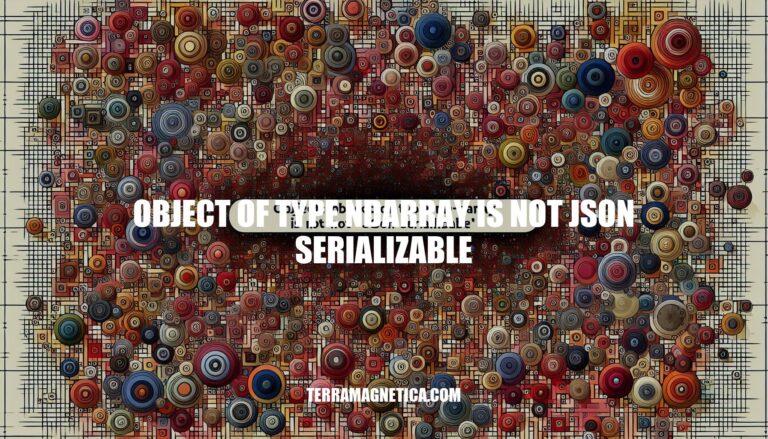


Serializing NumPy arrays into JSON format can pose a significant challenge for developers due to the inherent limitation that the object of type ndarray is not json serializable. When attempting to convert a NumPy array into a JSON string using Python’s standard json module, you will encounter an error message as the complex internal structure of NumPy arrays does not align with JSON’s supported data types. This limitation can impede data exchange processes, especially in scenarios requiring integration with web applications or handling large datasets.
When it comes to serializing a NumPy array in JSON format, one of the most significant challenges you’re likely to face is that object of type ndarray is not json serializable. This means that by default, Python’s built-in `json` module cannot convert a NumPy array into a JSON string.
The reason for this lies in the way JSON handles data types. While JSON supports a limited range of data types such as numbers, strings, booleans, arrays, and objects, it does not natively support more complex data structures like NumPy arrays. NumPy arrays are designed to efficiently store large amounts of numerical data, making them a crucial part of many scientific computing applications.
However, their complex internal structure, which includes metadata about the array’s shape, dtype, and other attributes, makes them difficult to serialize into a JSON string.
When you try to convert a NumPy array directly to JSON using Python’s `json.dumps()` function, you’ll encounter an error because the `ndarray` object is not a valid JSON serializable type. This limitation can be frustrating for developers who need to work with large datasets or integrate their code with web applications that rely on JSON data exchange.
Fortunately, there are ways to overcome this challenge by implementing custom solutions using Python’s `json.JSONEncoder` class and other libraries. One common approach is to convert the array into a nested list or dictionary, which can then be serialized into a JSON string.
To serialize a NumPy array as JSON, you’ll need to create a custom encoder that knows how to handle the complex internal structure of the array. Here are some strategies you can use:
These custom encoders can be used in conjunction with Python’s `json.dumps()` function to serialize NumPy arrays as JSON strings. By implementing these solutions, you’ll be able to overcome the limitation of object of type ndarray is not json serializable and work with large datasets or integrate your code with web applications that rely on JSON data exchange.
In conclusion, overcoming the obstacle that the object of type ndarray is not json serializable requires implementing custom encoding strategies to serialize NumPy arrays as JSON strings effectively. By converting the array into a nested list or dictionary and utilizing custom encoders in conjunction with Python’s json.dumps() function, developers can successfully work with NumPy arrays in JSON format. These solutions empower developers to leverage NumPy’s computational capabilities while seamlessly integrating with JSON-based data interchange requirements.
Understanding how to handle this serialization challenge equips developers with the tools needed to efficiently manage complex numerical data in their applications.